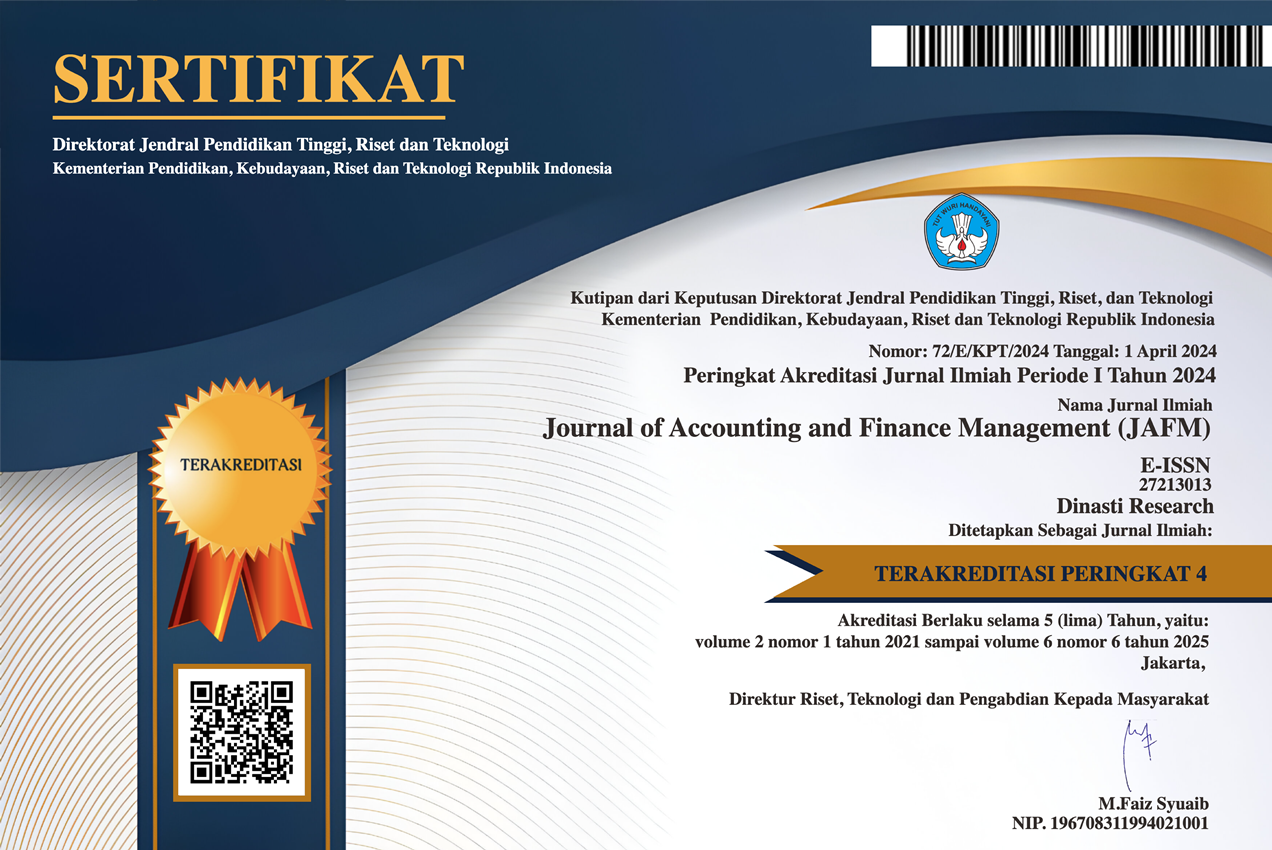The Influence of Leadership Style and Organizational Culture on Employee Performance with Motivation as an Intervening Variable at the Secretariat of the Regional People's Representative Council of Jambi Province
DOI:
https://doi.org/10.38035/jafm.v6i4.2426Keywords:
Leadership Style, Organizational Culture, Motivation, Employee PerformanceAbstract
This study aims to describe the leadership style, work facilities, discipline, and quality of public services at the Tungkal Ilir District Office, as well as to determine and analyze the influence of leadership style and work facilities on discipline and its impact on the quality of public services at the Tungkal Ilir District Office. This type of research uses descriptive verification research. This study uses the PLS analysis method. Based on the results of descriptive analysis, it explains that the leadership style is categorized as "Very Good. Work facilities are in the "good" category. Furthermore, discipline is in the "high" category. Meanwhile, the quality of public services is included in the "Good" category. Based on the results of research at the Tungkal Ilir District Office, West Tanjung Jabung Regency, it can be concluded that leadership style and work facilities have a positive and significant influence on discipline and the quality of public services. A good leadership style is not only able to improve employee discipline, but also has a direct impact on improving the quality of services to the public. The same thing also happens in work facilities, where adequate facilities and infrastructure support the creation of high discipline, which ultimately strengthens the quality of public services. In addition, discipline is proven to be an important factor that bridges the influence of leadership style and work facilities on service quality, so it can be concluded that effective leadership and adequate facility support, if accompanied by strong employee discipline, will significantly encourage improvements in the quality of public services.
References
Agustin, N. (2020). Manajemen sumber daya manusia. Jakarta: Prenada Media.
Ferdinand, A. (2010). Metode penelitian manajemen: Pedoman penelitian untuk skripsi, tesis, dan disertasi ilmu manajemen. Semarang: Badan Penerbit Universitas Diponegoro.
Fitriani, R. (2022). Kinerja pegawai dalam organisasi sektor publik. Yogyakarta: Pustaka Pelajar.
Ghozali, I. (2012). Aplikasi analisis multivariate dengan program IBM SPSS. Semarang: Badan Penerbit Universitas Diponegoro.
Hanafi, I., dkk. (2021). Pengaruh motivasi dan gaya kepemimpinan terhadap kinerja pegawai. Jurnal Ilmu Administrasi, 18(2), 123–135.
Jayanti, R., & Wati, R. (2019). Kepemimpinan dan efektivitas organisasi publik. Jurnal Manajemen dan Organisasi, 10(1), 55–66.
Kartono, K. (2013). Pemimpin dan kepemimpinan. Jakarta: RajaGrafindo Persada.
Kasmir. (2019). Manajemen sumber daya manusia (teori dan praktik). Jakarta: RajaGrafindo Persada.
Perda Provinsi Jambi No. 13 Tahun 2008; Pergub Jambi No. 29 Tahun 2008
Riduwan, & Kuncoro, E. A. (2013). Metode penelitian: Untuk penulisan skripsi, tesis, dan disertasi. Bandung: Alfabeta.
Robbins, S. P. (2017). Organizational behavior (17th ed.). Boston: Pearson Education.
Slamet, M. (2011). Motivasi kerja dalam organisasi. Jakarta: Bumi Aksara.
Sugiyono. (2012). Metode penelitian kuantitatif, kualitatif, dan R&D. Bandung: Alfabeta.
Sunyoto, D. (2013). Metodologi penelitian akuntansi. Bandung: Refika Aditama.
Syafri, U., & Alwi, H. (2014). Manajemen sumber daya manusia dalam organisasi publik. Jakarta: Rajawali Pers.
Tamimi, A., dkk. (2020). Pengaruh gaya kepemimpinan, budaya organisasi, dan motivasi terhadap kinerja pegawai. Jurnal Manajemen dan Bisnis, 7(1), 88–99.
Yandri, A., dkk. (2020). Gaya kepemimpinan, motivasi, budaya kerja, dan kinerja pegawai dengan kepuasan kerja sebagai variabel intervening. Jurnal Administrasi Publik, 15(2), 101–114.
Downloads
Published
How to Cite
Issue
Section
License
Copyright (c) 2025 Rachmad Fadhil Wildan, Saiyid Syekh, Ali Akbar

This work is licensed under a Creative Commons Attribution 4.0 International License.
Authors who publish their manuscripts in this journal agree to the following conditions:
- The copyright on each article belongs to the author(s).
- The author acknowledges that the Journal of Accounting and Finance Management (JAFM) has the right to be the first to publish with a Creative Commons Attribution 4.0 International license (Attribution 4.0 International (CC BY 4.0).
- Authors can submit articles separately, arrange for the non-exclusive distribution of manuscripts that have been published in this journal into other versions (e.g., sent to the author's institutional repository, publication into books, etc.), by acknowledging that the manuscript has been published for the first time in the Journal of Accounting and Finance Management (JAFM).
























